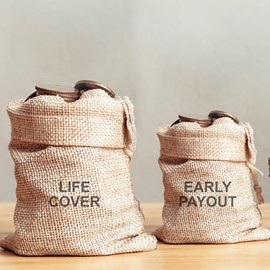
You can buy disability or severe illness cover as stand-alone benefits, or as an early part-pay out of your life cover.
It is very important to understand the substantial difference taking out accelerated cover could make to the finances of your family should you die after claiming for an early pay out.
![]() Accelerated cover is likely to be substantially cheaper than standalone cover, but you need to understand what cover you need before you choose one over the other.
Accelerated cover is likely to be substantially cheaper than standalone cover, but you need to understand what cover you need before you choose one over the other.
If you claim on stand-alone disability or dread disease cover, your life cover remains intact and will pay out in full if you subsequently die.
But when the benefits are accelerated pay outs and you claim them, your beneficiaries will receive a lower pay out should you subsequently die while the cover is still in force.
For example, you may take out R1 million in life cover, with R300 000 in severe illness benefits as an accelerated rider. Should you be diagnosed with, for example, cancer, the policy will pay out R300 000. Should you then die from the cancer – possibly years later, your life policy will pay out only R700 000, and not R1 million.
If your benefits were standalone, the severe illness benefit would pay out R300 000 and should you subsequently die, the life benefit of R1 million would be paid.
In total, the benefits the life company would pay would be R1.3 million instead of R1 million which is why cover with accelerated benefits are typically cheaper.
Early payout
Life insurance companies use the term “an accelerated rider on a life insurance policy” to describe severe illness or disability benefits that are an early pay out of your life benefit.
![]() If you have accelerated cover, for severe illness for example, and you claim for the full early pay out, your cover for severe illness will usually cease completely.
If you have accelerated cover, for severe illness for example, and you claim for the full early pay out, your cover for severe illness will usually cease completely.
However, if you have stand-alone cover, your life insurer may offer you the opportunity to claim the full cover amount more than once if you suffer multiple but medically unrelated severe illnesses.
Ask for advice about which benefit is best for you as it will depend on your circumstances and what you can afford.
Accelerated disability benefits can work well on a policy that is intended to pay off a debt but may be less suitable when you are trying to provide for your income needs in case you become disabled or fall ill and you want to ensure your family’s needs are met should you subsequently die.
Some insurers may allow you to convert life cover into cash for a number of life-changing events, including cancer. This means that you can claim an accelerated pay out for severe illness even when you do not have this cover on your policy.
Can I reinstate cover I have used?
If an insurer offers you accelerated benefits on a policy, you may be able to buy what is known as a reinstatement option.
![]() This will take your life cover back to the level of cover you enjoyed before you claimed accelerated severe illness or disability benefits.
This will take your life cover back to the level of cover you enjoyed before you claimed accelerated severe illness or disability benefits.
However, typically the cover is only reinstated after you have survived for a certain period after the disability or severe illness claim (typically six months from when the claim was made, or severe illness was diagnosed).
The reinstatement cover comes at an additional cost but is generally still cheaper than if you opt for stand-alone cover.
You need to choose whether you want the reinstatement of life cover option at the outset of the policy.
